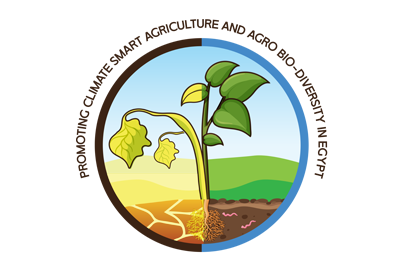Not only is the physical loss of land of major concern, but the loss of soil fertility, deteriorating surface and groundwater quality and loss of biodiversity. Soil salinisation is a real threat to the livelihood of millions of smallholder farmers in the Nile Delta (particularly the old lands of Beheiria and Kafr El Sheikh Governorates) and throughout Egypt.
It has been estimated that between 12 and 15 percent of the Nile Delta’s irrigated land is already suffering from problems of waterlogging, salinisation and sodicity. It is estimated that about 3.8 million tonnes per year of rice straw are disposed by burning directly in the open fields causing environmental problems with air pollution – what is called the “black cloud” in Cairo and other urban centres – and significantly increases greenhouse gas (GHG) emissions. Much of this, along with other agricultural waste (e.g. commercially sub-standard dates and date palm leaves), could be processed for compost (to improve soil health), animal feed (to reduce the pressure on the overgrazing of rangelands), green energy sources and other commercially viable products while generating income and creating jobs.
The Project will contribute to the adaptation to climate change of poor and vulnerable rural populations in the old and new lands of Egypt, namely in 36 Hayat Karima villages within Aswan, Beheira and Kafr El-Sheikh. This objective is to be achieved by developing and implementing nature-based and climate-resilient techniques – ensuring that no one relying on agricultural production and agri-food systems for their wellbeing is left behind (including landless, unemployed, underemployed or seasonally employed rural women and youth). The Project will thus reduce food insecurity induced by climate change and will improve livelihoods.
Activities
- Conduct studies, assessments and analyses on climate change, biosecurity, gender, resilience, and revision of CSA technologies and practices already in use by the farming community.
- Develop an applied R&D programme for CSA technologies and practices.
- Develop FFS curricula and establish FFS programmes for promoting nature-based practices for restoring and protecting on-farm biodiversity and soil health that include male, female and youth farmers.
- Conduct training for FFS Master trainers and Facilitators.
- Restore and protect the biodiversity of date palm plantations and ensure biodiversity of soil health.
- Establish small enterprises for the valorisation of agricultural waste for restoring soil health, improving air quality, reducing greenhouse gas (GHG) emissions, and generating income.
- Link smallholder farmers to an early warning system for weather risk management.
- Establish Public-Private-Community Partnerships (PPCPs) along commodity value chains to sustain the marketability of surplus food production as a result of CSA and nature-based/on-farm biodiversity enhancement technologies and practices adopted by vulnerable smallholder farmers.
- Raise awareness of rural communities on the importance of gender-responsive CSA and nature-based biodiversity enhancement technologies and practices and local environmental protection measures for climate change adaptation and biodiversity enhancement.
- Raise awareness among decision and policy makers on gender-responsive smallholder agricultural climate change adaption and biodiversity enhancement.
Outputs
- Smallholder men and women farmers adapting to climate change while increasing their agricultural production and productivity through the adoption of innovative and improved CSA technologies and practices.
- Enhanced biodiversity of smallholder farming systems as an adaptation strategy to climate change – with a focus on soil and plant health, maximising the utilisation of local date palm varieties and valorisation of environmentally harmful agricultural waste.
- An enabling environment created for the integration of climate change adaptation and the promotion of CSA and nature-based/on-farm biodiversity enhancement technologies and practices into local agri-food systems created at community, district, governorate and national levels.
Government counterparts
Ministry of Agriculture and Land Reclamation (MoALR) is the lead government agency; with support from the Ministry of Water Resources and Irrigation (MoWRI), Ministry of Environment (MoE) and National Council for Women (NCW).
Stakeholders
- Smallholder farmers.
- Women and youth.
- Government officials and technical staff.
- Agricultural supplies traders.
- NGOs.
- Media.
- Policy makers.
- Donor community.


